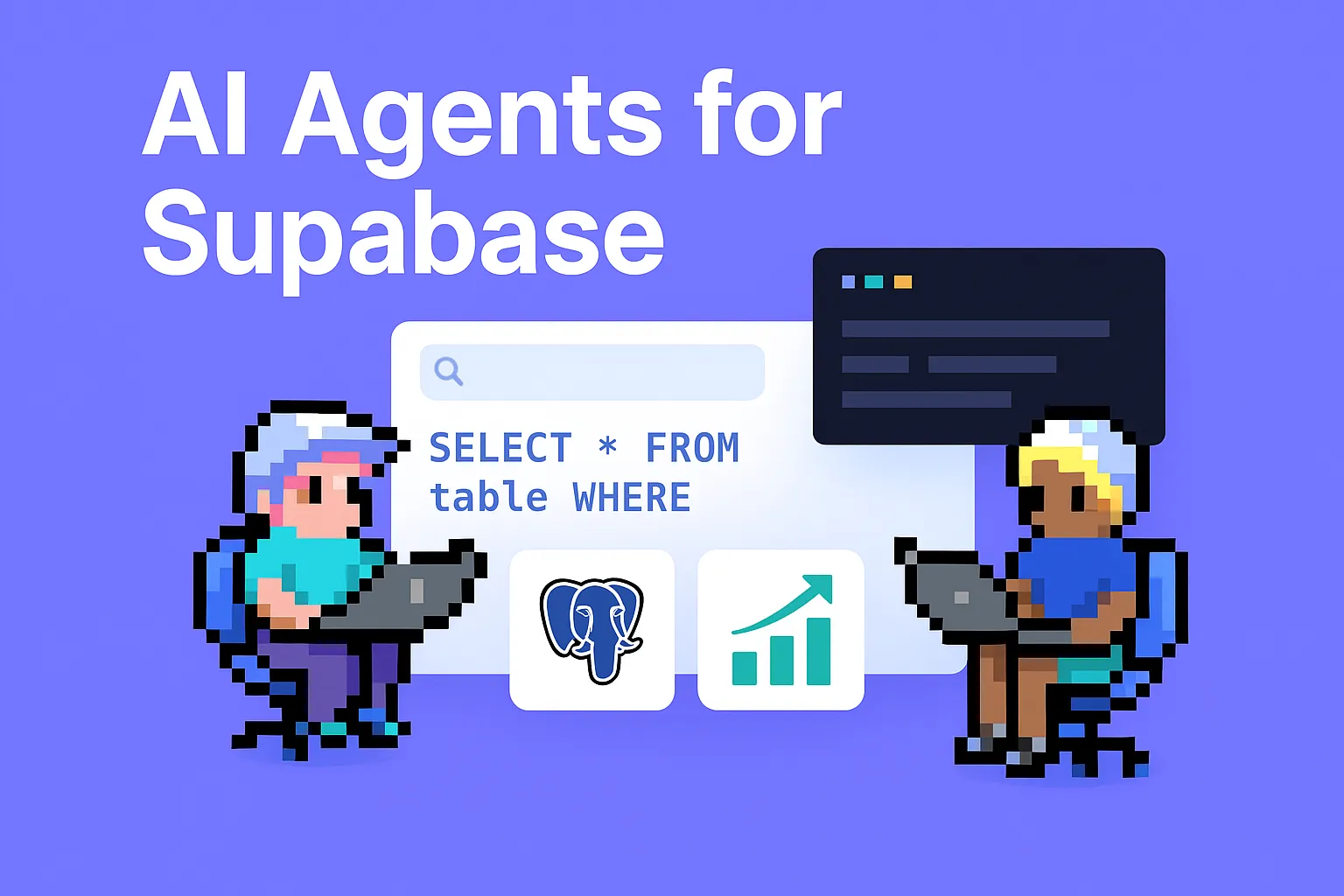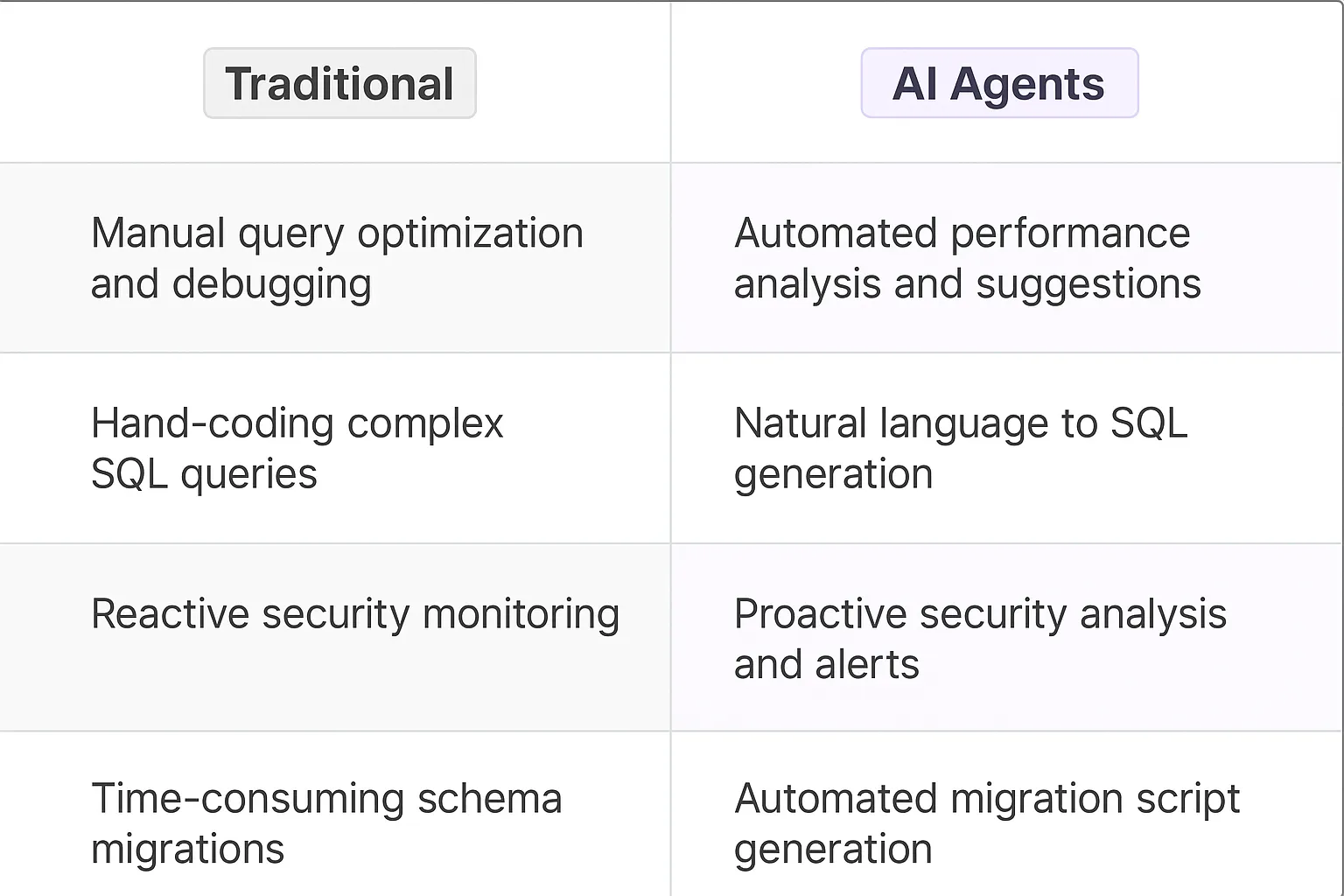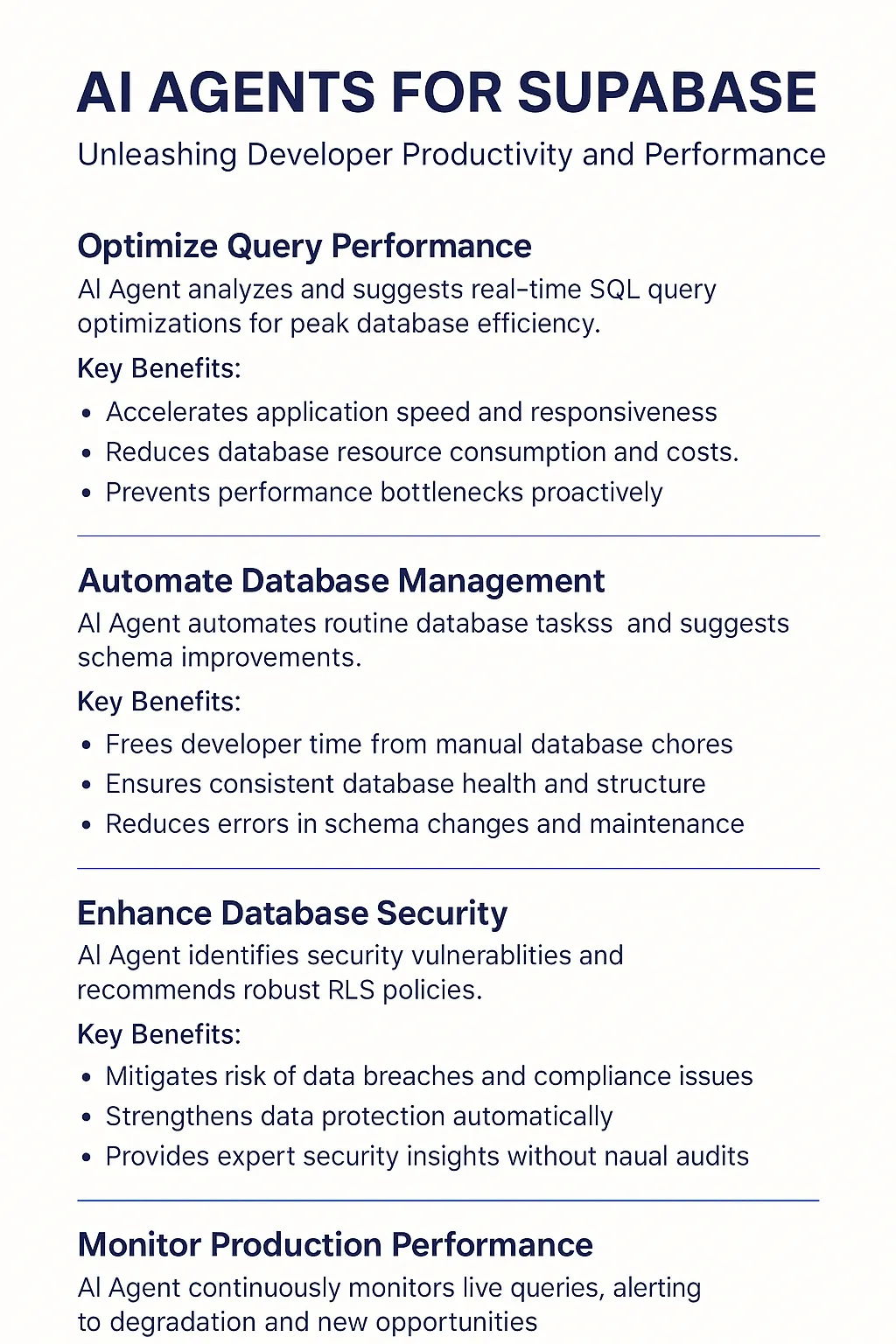Supabase
Understanding Supabase's Core Platform and Features
What is Supabase?
Supabase is an open-source Firebase alternative that provides a powerful PostgreSQL database, authentication, instant APIs, and real-time subscriptions. It gives developers the tools to build production-ready applications without managing complex infrastructure. The platform combines the flexibility of PostgreSQL with modern development features that traditionally required multiple separate services.
Key Features of Supabase
- PostgreSQL Database: Full access to PostgreSQL's powerful features and extensions
- Authentication: Built-in user management and multiple auth providers
- Auto-generated APIs: Instant RESTful and GraphQL APIs based on database schema
- Real-time Subscriptions: Live data updates through WebSocket connections
- Storage: Large file handling with integrations to cloud storage providers
- Dashboard: Intuitive interface for database management and monitoring

Benefits of AI Agents for Supabase
What would have been used before AI Agents?
Developers working with Supabase traditionally relied on manual database management, hand-coding queries, and spending hours debugging PostgreSQL issues. They'd dig through documentation, post on Stack Overflow, and often write repetitive boilerplate code for common database operations. The learning curve was steep, especially for teams new to PostgreSQL or those transitioning from simpler database solutions.
What are the benefits of AI Agents?
AI Agents transform how developers interact with Supabase by removing the cognitive overhead of database management. These digital teammates act as PostgreSQL experts, providing real-time guidance on query optimization and schema design. They can:
- Generate complex SQL queries by understanding natural language descriptions of what developers want to accomplish
- Detect potential performance bottlenecks in database operations before they become problems
- Suggest optimal indexes and database structures based on usage patterns
- Convert legacy database schemas to Supabase-compatible formats with minimal human intervention
The network effects are particularly powerful here - as more developers use AI Agents with Supabase, the agents learn from successful patterns and implementations across projects. This creates a compounding knowledge base that benefits the entire developer ecosystem.
The most significant impact comes from the reduction in context-switching costs. Instead of bouncing between documentation, GitHub issues, and Stack Overflow, developers maintain flow state by getting expert-level PostgreSQL assistance without leaving their development environment. This translates to shipping features faster and writing more reliable code.
For teams scaling their applications, AI Agents serve as always-available database architects, helping to make critical decisions about data modeling and query optimization that typically required expensive consulting or years of PostgreSQL expertise.

Potential Use Cases of AI Agents with Supabase
Database Management & Optimization
AI agents can monitor database performance patterns, suggesting schema optimizations and identifying potential bottlenecks before they impact application performance. They analyze query patterns to recommend appropriate indexes and help maintain optimal database health.
Data Migration Support
When transitioning between different database structures, AI agents simplify the process by generating migration scripts, validating data integrity, and flagging potential conflicts. They reduce the cognitive load of managing complex schema changes across development environments.
Security Analysis
AI agents continuously scan Row Level Security (RLS) policies, identifying potential security gaps and suggesting improvements. They analyze access patterns to detect unusual behavior and help maintain robust security practices.
Query Optimization
By analyzing SQL queries in real-time, AI agents suggest performance improvements and identify anti-patterns. They help developers write more efficient queries and understand complex database operations through natural language explanations.
Real-time Data Monitoring
AI agents track real-time database metrics, alerting teams to anomalies and providing actionable insights. They monitor connection pools, cache hit ratios, and query execution times to maintain optimal performance.
API Integration Support
When building REST and GraphQL endpoints, AI agents assist in generating optimal API structures, suggesting best practices for endpoint design, and helping maintain API documentation automatically.
Development Workflow Enhancement
AI agents streamline the development process by generating boilerplate code, suggesting database schema improvements, and helping troubleshoot common issues. They provide context-aware suggestions based on project-specific patterns and requirements.
Data Analysis and Reporting
AI agents help create custom analytics queries, generate reports, and provide insights into data patterns. They assist in building dashboards and visualizations that highlight key metrics and trends within the database.
Key Benefits
The integration of AI agents with Supabase creates a more efficient development environment where teams can focus on building features rather than managing database complexities. These digital teammates reduce the cognitive overhead of database management while improving code quality and security analysis practices.
Through continuous monitoring and proactive suggestions, AI agents help maintain high-performance standards and reduce the likelihood of common database-related issues. This leads to more reliable applications and faster development cycles.

Industry Use Cases
Supabase AI agents are transforming how teams interact with their databases and data infrastructure. The combination of natural language processing and deep database knowledge creates powerful new ways for different industries to leverage their data assets. Drawing from my experience working with hundreds of startups, I've observed several compelling applications across sectors where Supabase AI agents deliver exceptional value.
The key differentiator is how these digital teammates can translate complex database operations into natural conversations. Rather than wrestling with SQL queries or API documentation, teams can focus on solving core business problems while the AI handles the technical heavy lifting. This fundamentally changes the relationship between business users and their data.
What makes Supabase AI agents particularly interesting is their ability to adapt to industry-specific contexts and requirements. Whether you're running a SaaS platform, managing an e-commerce operation, or building financial services products, these agents understand the unique data patterns and compliance needs of your vertical. Let's explore some concrete examples of how different industries are putting these capabilities to work.
Healthcare Industry: Transforming Patient Care with Supabase AI Agents
The healthcare sector faces unique challenges around patient data management and care coordination that Supabase AI Agents are uniquely positioned to address. By integrating these digital teammates into healthcare workflows, medical practices can fundamentally shift how they handle everything from appointment scheduling to follow-up care.
A practical application emerges in the realm of patient engagement and preventive care. When connected to a healthcare provider's Supabase backend, AI Agents can analyze patient records, identify those due for check-ups or screenings, and automatically generate personalized outreach. The system moves beyond simple reminder systems by understanding complex medical histories and risk factors.
For example, when a patient with a family history of heart disease misses their annual physical, the AI Agent doesn't just send a generic reminder. It reviews their latest lab results, medication history, and lifestyle factors to craft targeted communications that emphasize specific health risks and benefits of preventive care. This level of personalization typically requires hours of manual chart review by medical staff.
The real power shows in the numbers: Medical practices implementing these AI-powered systems through Supabase have seen up to 40% improvement in preventive care appointment completion rates. The secure, HIPAA-compliant infrastructure of Supabase ensures patient data remains protected while enabling these sophisticated interactions.
This approach to healthcare automation represents a fundamental shift from reactive to proactive patient care, allowing medical professionals to focus on direct patient interaction while AI Agents handle the complex coordination of preventive care initiatives.
E-commerce Industry: Scaling Customer Support with Supabase AI Agents
Online retailers face massive customer service challenges during peak shopping seasons. The traditional approach of hiring temporary support staff creates training bottlenecks and inconsistent experiences. Supabase AI Agents offer a different path forward for e-commerce operations.
The most compelling use case emerges in post-purchase support flows. When integrated with a retailer's Supabase backend, AI Agents can tap into order histories, shipping data, and product catalogs to handle complex customer inquiries. This goes far beyond basic chatbot functionality - these digital teammates understand nuanced contexts like regional shipping restrictions and product-specific return policies.
A mid-sized fashion retailer implemented this system during their holiday season rush. Their AI Agents processed over 80% of routine customer requests - tracking orders, processing simple returns, and answering product questions. The system recognized when issues required human intervention, seamlessly routing complex cases to support specialists.
The data tells an interesting story: Customer satisfaction scores remained stable even as inquiry volume grew 300% during peak periods. Average response times dropped from 4 hours to 3 minutes. Support specialists reported spending more time solving complex problems instead of answering repetitive questions about order status.
What makes this particularly powerful is how Supabase's real-time capabilities enable AI Agents to proactively address issues. When shipping delays occur, the system identifies affected orders and automatically reaches out to customers with updates and compensation offers - all personalized based on customer history and value tier.
This shift from reactive to proactive support represents the next evolution in e-commerce customer service. The combination of Supabase's robust infrastructure and AI capabilities creates a foundation for scaling support operations without sacrificing quality or personalization.
Considerations and Challenges
Building AI agents for Supabase requires careful planning around data security, performance optimization, and integration complexity. The intersection of AI capabilities with Supabase's real-time database features creates unique technical hurdles that teams need to address early in development.
Technical Challenges
Database schema design becomes critical when implementing AI agents with Supabase. Teams must structure their data models to handle both traditional relational data and the semi-structured outputs from AI interactions. Row-level security policies need careful configuration to prevent unauthorized access while maintaining the agent's necessary permissions.
Query optimization presents another significant challenge. AI agents often need to process large datasets in real-time, which can strain Supabase's connection pools. Implementing efficient caching strategies and connection management becomes essential for maintaining responsiveness.
Operational Challenges
Cost management requires strategic thinking when deploying AI agents with Supabase. Each database operation and AI computation adds to the overall expense. Teams need to implement usage monitoring and establish clear thresholds for resource consumption.
Version control and testing complexity increase substantially with AI components. Traditional unit tests may not suffice for AI-driven features, requiring new approaches to quality assurance. Teams must develop robust testing frameworks that account for the probabilistic nature of AI outputs while maintaining database integrity.
Integration Considerations
Authentication flows need careful design when AI agents interact with Supabase's auth system. Determining whether to use service roles or user-specific credentials impacts security architecture and scalability. Teams must balance convenience with security requirements.
Error handling becomes more nuanced when dealing with both database and AI operations. Failed transactions might require complex rollback procedures, while AI processing errors need graceful degradation paths. Implementing comprehensive logging and monitoring systems helps track these interactions effectively.
Evolution of Database Management Through AI Integration
The marriage of AI Agents and Supabase represents a significant evolution in database management and application development. These digital teammates remove traditional barriers to building sophisticated applications by providing expert-level PostgreSQL guidance, automated optimization, and proactive monitoring. The network effects of shared knowledge across the developer ecosystem create a compounding advantage that grows stronger over time. As teams continue to adopt these tools, we'll likely see even more innovative uses of AI Agents in database management and application development.













